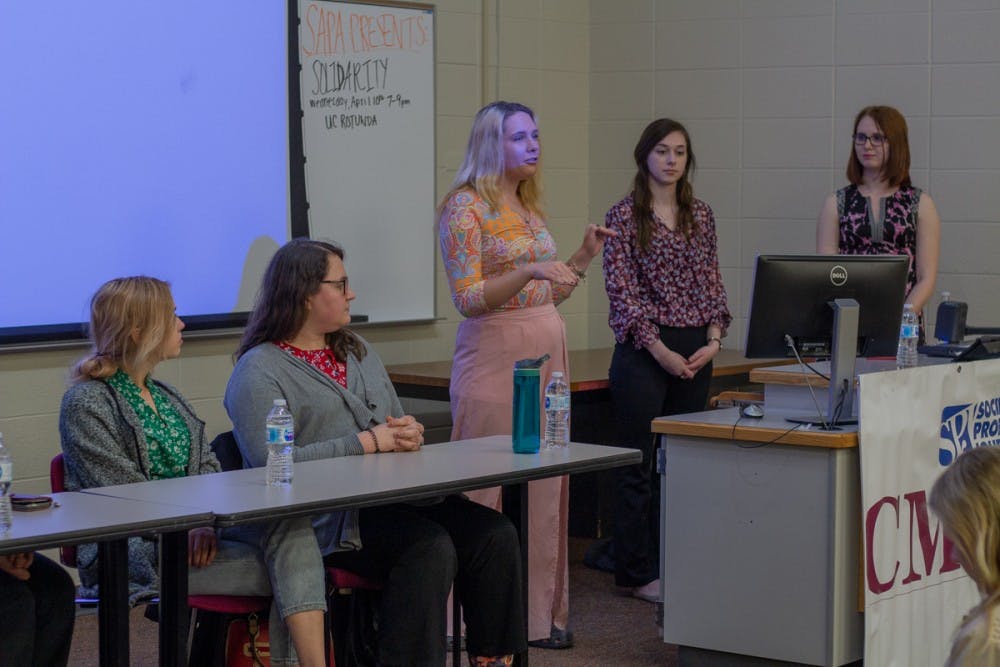Society of Professional Journalists hosts discussion on Freedom of Information Act

St. Clair Shores Junior Sam Shriber speaks during a Society of Professional Journalists panel April 11 in Moore Hall.
The Society of Professional Journalists gathered together with other students and faculty to discuss issues related to transparency with Central Michigan University.
Between 7-8:30 p.m. on April 11, SPJ hosted an event in Moore Room 105 called CMU FOIA: Just How Much Are We Allowed to Know? As the name would suggest, the event was centered around the group's annual Freedom of Information Act project. For this year’s project, they wanted to test transparency with CMU.
The event was led by SPJ Vice President Sam Shriber, SPJ Secretary Ashley Schafer and SPJ Fundraising Chair Sara Kellner, who moderated a panel of people related to the journalism industry to discuss their thoughts on SPJ’s project, along with interjections from audience members. The panelists included:
· Former SPJ president Patricia Alvord
· Gaylord Herald-Times reporter Arielle Breen
· CMU journalism department chair Tim Boudreau
· Central Michigan Life managing editor Emilly Davis
At the event, they described what a FOIA request is. Schafer said under the federal Freedom of Information Act, the public has the right to request public documents that are not readily available to the public. This is granted to all members of the public, not just journalists. But a common point of discussion throughout the event was how this process is difficult to do at CMU.
Last year’s FOIA project revolved around sexual assault and looking to see how easily schools would send over information regarding the topic. Schafer said CMU was the only university to deny sharing information, putting dead last compared to other universities.
“In Michigan, which is one of the worst states (with FOIA requests), CMU is probably the worst state institution,” Boudreau said.
This year, Kellner said the FOIA project was about going through the FOIA process with CMU and see how it’s conducted with them. Shriber said SPJ filed 10 FOIA requests to CMU regarding topics like sexual assault, suicide, domestic violence and the budget for hiring and firing the CMU football coach.
However, this proved to be quite the lengthy and pricey ordeal. Schafer said they sent their FOIA requests on Feb. 14, which 9 out of the 10 were granted on Feb. 22. They were also given an estimate for the cost, which was $233.95. After waiting for more than a month for the information, they contacted General Counsel (who handles FOIA requests) to get an update on the project.
SPJ was finally notified on April 10, the day before the event, saying that their documents were ready and would cost $468.38. The fee was paid for with money raised on a GoFundMe page, Schafer said. Her big take away from this process was that persistence is sometimes need for FOIA requests.
“It’s easy to forget, but it’s real people compiling these requests and sometimes communicating with them is the best way you’re going to get what you need,” Schafer said.
The panel was asked several questions from the audience and SJP members about their thoughts about the process they went through. When asked about what the documents will look like, Alvord said they will be most likely be heavily redacted.
When the panel was asked about what they thought of the fees, Boudreau said he was curious about how students feel about the university using their money to find out what happens at their university.
Last year's project and sexual assault was also a major point of discussion, with Davis talking about her experiences reporting on Rachel Wilson’s sexual assault case. She said Wilson had to FOIA for information related to her own sexual assault form the university. Even though the documents were about Wilson, Davis said the school redacted information on the documents.
SPJ members also said they want to know from the audience on what they should do with the information once they receive it. Since this was only part one of the project, they were looking for input on the next part.
Lake Orion senior Kylie Barber said she would want to see all the information they got in part two. She also wanted to see general counsel be represented on the panel at the conclusion of the project.
“To hear their perspective would be interesting because we’ve never had a (face-to-face) conversation with them,” Barber said. “It would be an eye-opening experience to see their side.”






